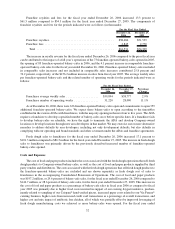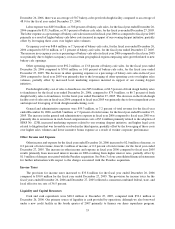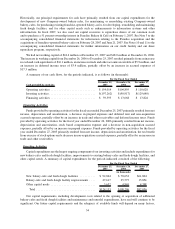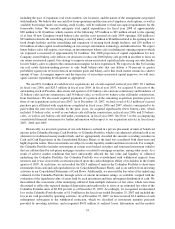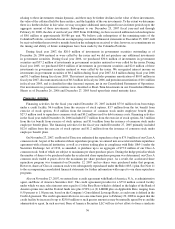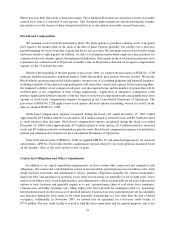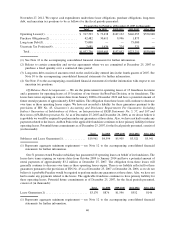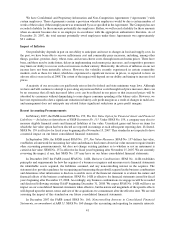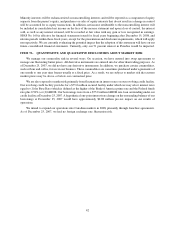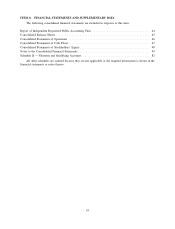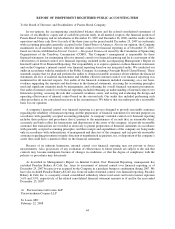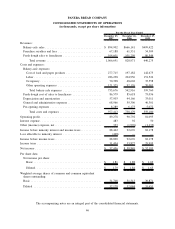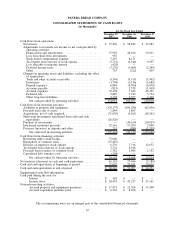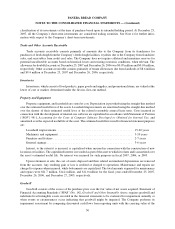Panera Bread 2007 Annual Report Download - page 51
Download and view the complete annual report
Please find page 51 of the 2007 Panera Bread annual report below. You can navigate through the pages in the report by either clicking on the pages listed below, or by using the keyword search tool below to find specific information within the annual report.We have Confidential and Proprietary Information and Non-Competition Agreements (“Agreements”) with
certain employees. These Agreements contain a provision whereby employees would be due a certain number of
weeks of their salary if their employment was terminated by us as specified in the Agreement. The Company has not
recorded a liability for these amounts potentially due employees. Rather, we will record a liability for these amounts
when an amount becomes due to an employee in accordance with the appropriate authoritative literature. As of
December 25, 2007, the total amount potentially owed employees under these Agreements was approximately
$9.1 million.
Impact of Inflation
Our profitability depends in part on our ability to anticipate and react to changes in food and supply costs. In
the past, we have been able to recover inflationary cost and commodity price increases, including, among other
things, gasoline, proteins, dairy, wheat, tuna, and cream cheese costs, through increased menu prices. There have
been, and there may be in the future, delays in implementing such menu price increases, and competitive pressures
may limit our ability to recover such cost increases in their entirety. Historically, the effects of inflation on our net
income have not been materially adverse. However, the volatility recently experienced in certain commodity
markets, such as those for wheat, which has experienced a significant increase in prices, is expected to have an
adverse effect on us in fiscal 2008. The extent of the impact will depend on our ability and timing to increase food
prices.
A majority of our associates are paid hourly rates related to federal and state minimum wage laws. Although
we have and will continue to attempt to pass along any increased labor costs through food price increases, there can
be no assurance that all such increased labor costs can be reflected in our prices or that increased prices will be
absorbed by consumers without diminishing to some degree consumer spending at the bakery-cafes. However, we
have not experienced to date a significant reduction in bakery-cafe profit margins as a result of changes in such laws,
and management does not anticipate any related future significant reductions in gross profit margins.
Recent Accounting Pronouncements
In February 2007, the FASB issued SFAS No. 159, The Fair Value Option for Financial Assets and Financial
Liabilities — Including an Amendment of FASB Statement No. 115. Under SFAS No. 159, a company may elect to
measure eligible financial assets and financial liabilities at fair value. Unrealized gains and losses on items for
which the fair value option has been elected are reported in earnings at each subsequent reporting date. If elected,
SFAS No. 159 is effective for fiscal years beginning after November 15, 2007. This standard is not expected to have
a material impact on our future consolidated financial statements.
In September 2006, the FASB issued SFAS No. 157, Fair Value Measures. SFAS No. 157 defines fair value,
establishes a framework for measuring fair value and enhances disclosures about fair value measures required under
other accounting pronouncements, but does not change existing guidance as to whether or not an instrument is
carried at fair value. SFAS No. 157 is effective for fiscal years beginning after November 15, 2007. We are currently
reviewing the impact, if any, that SFAS No. 157 may have on our future consolidated financial statements.
In December 2007 the FASB issued SFAS No. 141R, Business Combinations. SFAS No. 141R establishes
principles and requirements for how the acquirer of a business recognizes and measures in its financial statements
the identifiable assets acquired, the liabilities assumed, and any noncontrolling interest in the acquiree. The
statement also provides guidance for recognizing and measuring the goodwill acquired in the business combination
and determines what information to disclose to enable users of the financial statement to evaluate the nature and
financial effects of the business combination. SFAS No. 141R is effective for financial statements issued for fiscal
years beginning after December 15, 2008. Accordingly, any business combinations we engage in will be recorded
and disclosed following existing GAAP beginning December 31, 2008. We expect SFAS No. 141R will have an
impact on our consolidated financial statements when effective, but the nature and magnitude of the specific effects
will depend upon the nature, terms and size of the acquisitions we consummate after the effective date. We are still
assessing the impact of this standard on our future consolidated financial statements.
In December 2007 the FASB issued SFAS No. 160, Noncontrolling Interests in Consolidated Financial
Statements, an amendment of ARB 51. SFAS No. 160 changes the accounting and reporting for minority interests.
41



